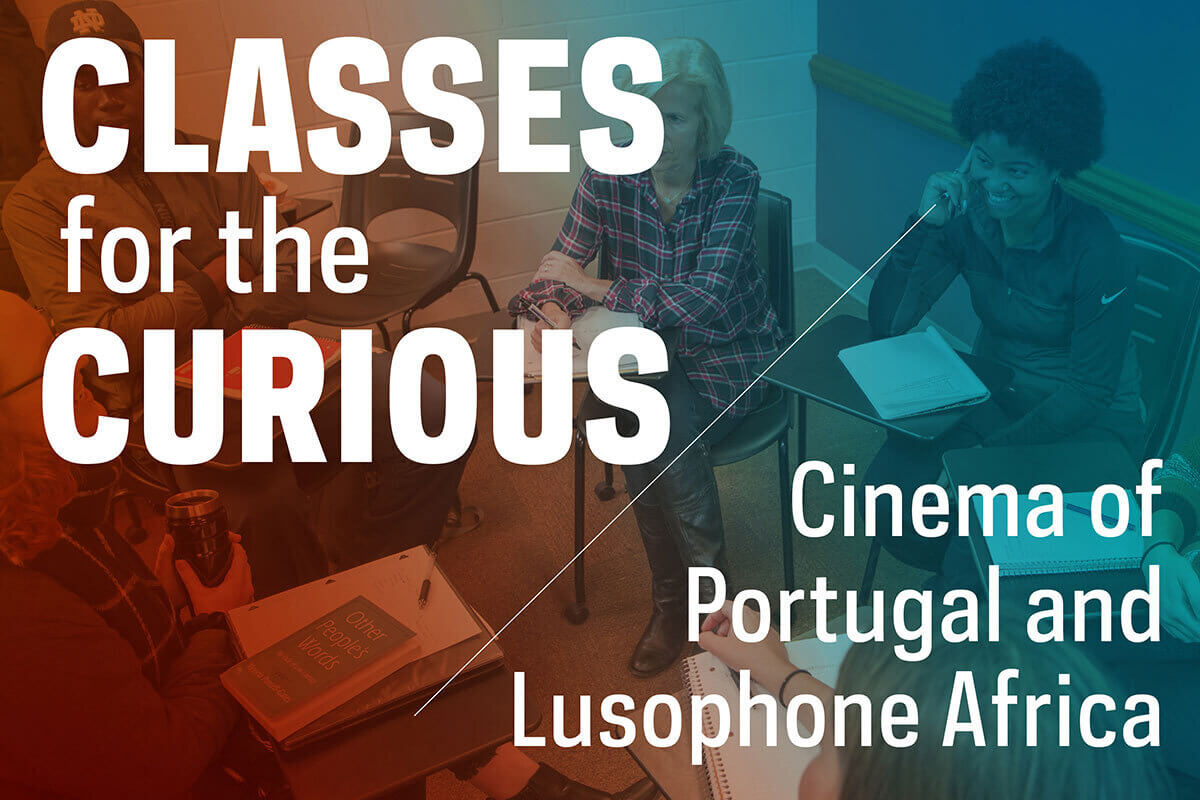

The class: Cinema of Portugal and Lusophone Africa
The professor: Ana Leticia Fauri, assistant teaching professor of Portuguese, Department of Romance Languages and Literatures
The focus: How major cultural, social, and historical events are portrayed in cinematographic productions of Portugal, Angola, Mozambique and Cape Verde. Issues explored include gender, racial, and social disparities, the legacies of dictatorship and the colonial wars, the Luso-African struggles for independence, the role of the language in building a nation, and the influence of Portuguese culture in its former colonies.
The syllabus: Films such as Dribbling Fate by Fernando Vendrell, Sleepwalking Land by Teresa Prata, and April Captains by Maria de Medeiros, Portugal), as well as the documentaries Lusitanian Illusion by João Canijo and Hope the Pitanga Cherries Grow (Angola) by Kiluanje Liberdade and Ondjaki.
For senior film, television, and theatre major Kiera Russo, the class was a highlight of her sophomore spring semester. That was due, in part, to all the students in the course engaging in deep discussions sparked by the films. Despite not knowing Portuguese, Russo understood the films because of the universal nature of the visual medium.
The following Q&A with Russo, who is also now working as an assistant producer on a feature-length film based on the life of legendary Irish leader Daniel O’Connell, has been edited for clarity and brevity. See more Q&As about Arts & Letters courses in the Classes for the Curious series here.
How do you describe your experience in the class to your roommate?
I would describe it as exploring the films that have been produced from Portugal and Lusophone Africa, and how the context of the historical period in which the film was produced informs the visual medium.

Why did you take the class?
I had extra space in my schedule, and the content seemed interesting. I was looking for film electives and this class had a niche focus — specific geographical sites and films those cultures and societies produced. It was a microcosmic look at how filmmaking works and how creation comes to be. That was the appeal to me.
I didn’t know any Portuguese, and a lot of the films were in Portuguese, so that was a challenge. Obviously, there were subtitles, but considering that film is a visual medium, it was interesting to consume a film, not know the language the film was made in, and still understand the story because of how it relies on visuals to communicate. It was interesting to see how those films were different, and similar, to films we create in the U.S.
How did this class change your understanding of the field that you are in, especially with your language studies?
Honestly, this class gave me a great foundation for the film studies that I’ve continued in my college career, especially last semester while I was in Spain. It’s fascinating seeing film through a lens of the specific country that you're in. This class taught me a lot about how film is made, distributed, and exhibited throughout the world.
The economy of storytelling and film is visual — and visuals are, for the most part, a universal language. So it's very cosmopolitan and connects us all regardless of whether we know the language the movie is made in.
By taking away my focus on the language of the film — I knew I wouldn’t be able to understand the film if I focused on the language and that I had to focus on the visuals — it really trained my eye to pick up visual motifs and metaphors threaded throughout the film. That is super helpful for any film major because that’s the language of filmmaking. It borrows the rhetorical devices we see in literature and it translates them to a visual medium, but you still have motifs, and metaphors, and symbols, and all of the other things that make a work creative. It taught me that film can be a universal language.
Film is also a way for people to express themselves. A lot of the films dealt with very heavy topics — national crises, instability, political tension, and turmoil — but reflected the time period that they were made in and intended to explore. Film can be a vehicle across cultures, and a vehicle by which we understand the culture that we live in.
What was the most thought-provoking material from class, and why?
We did several critical essays and screen reports. For each critical essay, we picked a film that we really liked — and we had a wide array to choose from — and we critiqued it. We talked about how the ocean is used as a symbol throughout certain films, and often across films. And we talked about the use of memory through the cinematic device of the montage.
We also discussed how one comes to identify themselves, especially within the Lusophone countries Angola, Mozambique, and Cape Verde. Those were especially interesting films because a lot of those countries were colonized by Portugal. It was interesting seeing how the film represented the culture coming into their own, and defining their own independence and their own identity apart from Portugal, but also how they were influenced by Portugal.
Again, it’s a universal language. We all struggle with self-identity and the truth, whether memory is truth, and how we differentiate ourselves from our pasts while reconciling the fact that we’re different. I’m going into really meta stuff right now, but that’s what you talk about with film. We would start discussing the content of the film, the characters, and the arc. Then, we would get into these deep conversations about philosophy. It was interesting to use movies as a springboard to that.
What sets the class apart? Who would you recommend it to?
For me, what set it apart, primarily, was the class size. Most of my classes at that point had been in lecture halls or in bigger auditoriums where you don’t really have a chance to speak. But with this discussion-focused class, you have space to be able to form your opinion, throw out different things, and think out loud.
I would recommend the class to film students, obviously, and to anybody with an interest in film. Anybody who likes to discuss film, this is a great class, regardless if you know Portuguese. I had no knowledge of Portuguese or this culture, but I learned so much. It was such a highlight of my sophomore year spring.
Is there anything else you’d like to add?
When I was studying abroad, I stayed in contact with Professor Fauri. I traveled to Portugal with a bunch of friends, and she sent me a list of recommendations for restaurants, sightseeing, hotels, and everything regarding what I should do while there. She was extremely thorough, and that speaks to her commitment to her students.
“A lot of the films dealt with very heavy topics — national crises, instability, political tension, and turmoil — but reflected the time period that they were made in and intended to explore. Film can be a vehicle across cultures, and a vehicle by which we understand the culture that we live in.”
Originally published by at al.nd.edu on January 23, 2023.